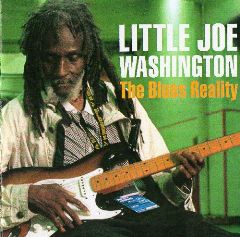Little Joe Washington with Texas Eastside Kings – The Reality Blues (2005)
Little Joe Washington with Texas Eastside Kings – The Reality Blues (2005)

01. Woke Up This Morning Blues - 3:11
02. Find Me A Good Woman - 3:15
03. Lil' Joe's Stomp #1 - 5:00
04. Since I Met You (A Tribute To T-Bone Walker) - 4:42
05. 220 - 2:07
06. The Ghetto - 5:08
07. No Woman - 3:06
08. Ain't Nobody's Business - 4:49
09. Bright Lights, Big City - 4:33
10. C Jam Blues - 5:04
11. Need Your Loving - 5:04
12. The Texas Shuffle - 3:23
13. Me And Lightin' (A Tribute to Lightin' Hopkins) - 3:29
14. No. 19 - 2:27
15. Please Love Me - 5:39
Little Joe WASHINGTON - Guitar (except tr.8,9), Vocals
with: TEXAS EASTSIDE KINGS
Clarence Pierce - Guitar and Vocals tr.8,9
James Kuykendall - Bass; Wes Starr - Drums
Nick Connolly - Piano, B3 Hammond Organ
with special guest
Mitsuyoshi Azuma - Guitar tr.10,11,12
There are certain things you must know if you are going to watch Little Joe Washington play the blues. You should know that Little Joe has been called the following (depending on who you’ve asked): genius, addict, legend, joke. You should know that Little Joe is going to entertain you.
And you should know that this entertaining might be done by his real, honest-to-God amazing blues-playing or by his onstage antics that include — among other things — playing with his teeth, his groin, his head; stopping a song in the middle when it has no place else to go; demanding money to play a request, then hollering: “I don’t take any requests because I don’t know what the hell I’m doing myself.”
Little Joe Washington was born Marion Washington in 1939. His mother, Erline Washington, was a beautician who sang in a choir. He never knew his father. An aunt and uncle who ran a soul food cafe and a barbershop on the corner of Beulah and Velasco in the Third Ward raised Marion. The family lived upstairs, and the building sat just a stone’s throw from railroad tracks, across the street from Albert Collins’s home, not far from Joe Hughes’s house and down the lane from the second location of Shady’s Playhouse, a major piece of legend in Houston blues lore. Basically Marion was born into a literal crossroads of Houston blues. Music surrounded him, “like the humidity,” says Roger.
When Marion was a young boy, his uncle attempted to teach him the piano, and Marion took lessons from a woman down the street, but he preferred to teach himself. While still in grade school he would hear the sound of the Yates High School marching band rehearsing nearby. Following the beat of the band, Marion would practice keeping rhythm on anything that didn’t move.
A man named Vernon Jackson ran Shady’s, which moved to the corner of Beulah and Sauer from the corner of Elgin and Ennis sometime in the late 1950s. The gritty, come-as-you-are club with its red-and-white-checked tablecloths became Marion’s classroom. After dropping out of Yates High School in the ninth grade (where he played trumpet in the marching band), he began to play and hang out there before he was old enough to be allowed in. His first professional gig was drumming for Albert Collins, his neighbor. At around the same time, Joe Hughes started dating Marion’s cousin, Willie Mae. Marion, who quickly discovered taking down the drums after a gig left him with little time to go after the girls, started playing the guitar, just like Joe Hughes.
“I had just started making a little name for myself,” remembers Joe Hughes, a soft-spoken gentleman who still kisses young women on the hand when they are introduced to him. “And he was always smaller, so we just started calling him Little Joe. And it stuck.”
And there are things you must know if you are going to try to understand Little Joe Washington.
First, that he grew up in the Third Ward blues scene and played with the established Texas legends: Albert Collins, Lightnin’ Hopkins, Joe Hughes, T-Bone Walker, Johnny Copeland. Second, that he has lived much of the past 20 years as a marginally homeless man in a shell of a house and an abandoned car. Third, that there are several people in the African-American Houston blues scene who are tired of Little Joe and his signature habit of darting into blues clubs, playing for 20 minutes, passing his hat for money and then darting out again. And finally, you should know that there are people who love Little Joe so much that they have scored him this regular gig at the Continental and have even given him a place to live upstairs.
There, up on stage, is Little Joe Washington. His music, which is never rehearsed, borrows licks from Leadbelly and Albert Collins without his stopping to think about it. His body, which is painfully skinny, sometimes likes to roll on the floor in the middle of the set. The Continental Club crowd, which is mostly white, giggles at his stage presence and applauds generously. And Little Joe Washington sums it all up when he pauses suddenly and announces, “I was talkin’ to T-Bone Walker and he says, ‘Little Joe, play for yourself. Because it don’t matter about anybody else.’ “
download (mp3 @320 kbs):
yandex mediafire ulozto solidfiles global.files
Zmieniony (Wtorek, 06 Kwiecień 2021 16:11)








